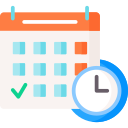
Effective Strategies for Daily Living with ADHD
Task Segmentation
Divide your tasks into manageable parts to avoid feeling overwhelmed.
Structured and Flexible Breaks
Establish regular intervals for breaks to maintain focus and productivity, adjusting as necessary.
Remote Work Flexibility
Leverage the freedom of working from different environments to stay stimulated and engaged.
Use of Technology Aids
Implement alarms, timers, and apps designed for time management to keep on track with daily tasks.
Noise Management
Consider noise-canceling headphones or background music tailored for concentration to minimize distractions.
Organizational Tools
Utilize color-coding, planners, and sticky notes to organize tasks visually and enhance memory retention.
Mobility in Workspace
Opt for a laptop and a comfortable, mobile-friendly chair (like a gaming chair) to allow for movement and position changes.
Mindfulness and Meditation
Dedicate time for guided meditation using apps such as Headspace or Calm to improve focus and self-compassion.
Diet Considerations
Explore the impact of dietary changes on ADHD symptoms, potentially eliminating artificial additives or exploring the effects of Matcha as a caffeine alternative.
Routine Practices
Keep frequently used items in consistent places to avoid misplacement and stress.
Regular Scheduling
Review your agenda regularly to stay oriented with upcoming tasks and appointments.
Audio Support
Record instructions verbally to ensure clarity and recall.
Self-Care Commitment
Allocate at least 30 minutes daily for activities that foster creativity and relaxation.
Yoga for ADHD
Engage in yoga poses that aid in energy flow and focus, particularly those that target the root and sacral chakras.



Comments